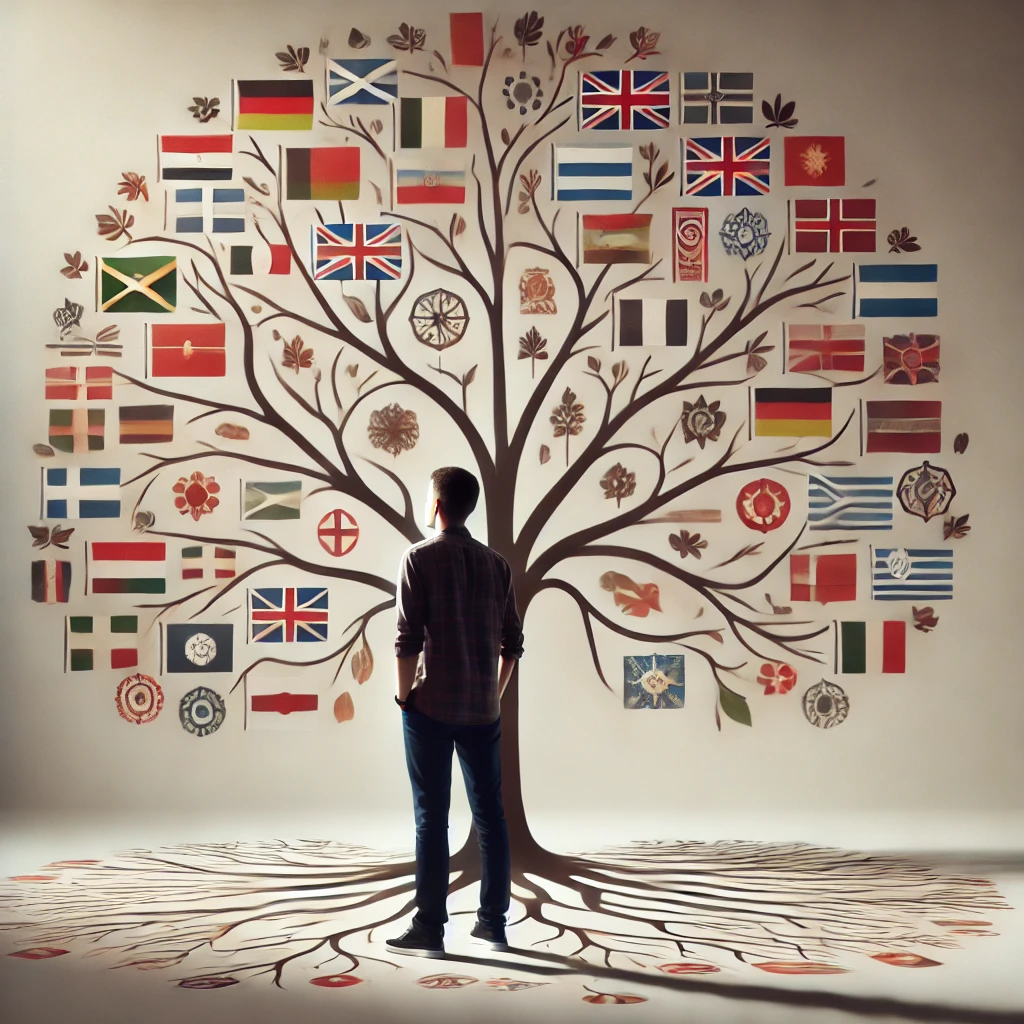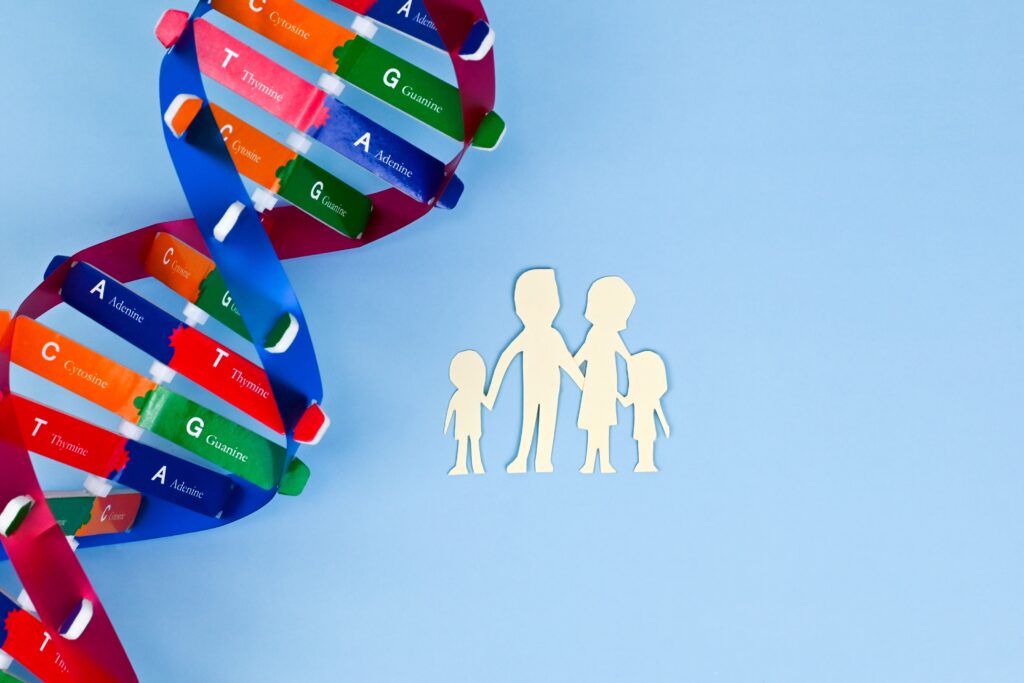The Link Between
Ancestry and Mental Health
The Link Between Ancestry and Mental Health (Exploring the Genetic and Cultural Dimensions)

Let us explore a fascinating and complex topic: the link between ancestry and mental health. We will delve into the genetic and cultural dimensions that shape our mental well-being. Understanding these connections can provide valuable insights into our mental health journey.
The Genetic Aspect

- Inherited Predispositions
Our genes are a blueprint for our physical and mental health. Conditions like depression, anxiety, and schizophrenia often have genetic components. If you have a family history of these issues, you may have a higher risk due to inherited genetic variations.
- Genetic Ancestry
Our genetic makeup is influenced by our ancestors. Certain genetic markers related to mental health conditions are more prevalent in specific populations. Understanding your genetic ancestry can help identify potential predispositions and risk factors.
- Epigenetics
Epigenetics involves changes in gene expression without altering the DNA sequence. Environmental factors, including cultural practices, can influence gene expression. This means the cultural practices of our ancestors might impact our mental health today.
The Cultural Aspect

- Cultural Values and Beliefs
Cultural heritage shapes our values, beliefs, and coping mechanisms. Different cultures have unique approaches to mental health, which can either support or hinder well-being. For instance, cultures that stigmatize mental health issues may deter individuals from seeking help, leading to poorer outcomes.
- Inter-generational Trauma
Cultural trauma, passed down through generations, can profoundly impact mental health. Historical events like war, colonization, or forced migration can leave lasting imprints on a community’s psyche. Understanding this context helps grasp inter-generational trauma affecting mental health today.
- Cultural Practices and Resilience
Cultural traditions can provide resilience and support for mental health. Engaging in rituals, connecting with one’s cultural community, and drawing strength from cultural values can be protective factors against mental health challenges.
The Intersection of Genetics and Culture

- Identity and Self-Esteem
Ancestry shapes our sense of identity, influencing mental health. A strong connection to cultural heritage can foster belonging and self-esteem, buffering against mental health issues. Conversely, disconnection from roots may increase vulnerability.
- The Role of Mixed Ancestry
Many individuals have diverse ancestral backgrounds. Navigating multiple heritages can be enriching and challenging for mental health. Embracing all aspects of one’s ancestry is essential for a holistic sense of self.
- Access to Healthcare
Ancestry can influence access to healthcare. Some populations face barriers to mental health services due to cultural stigma or disparities in healthcare access. Addressing these disparities is crucial for improving mental health outcomes.
Conclusion

Exploring our ancestry can provide valuable insights into our mental health. It helps uncover risk factors, protective factors, and sources of resilience. Embracing our ancestral heritage can empower us to make informed choices about our mental well-being and contribute to a more comprehensive understanding of mental health.
If you are struggling with mental health due to family history or trauma, consider reaching out for help. There are resources and professionals available to support you on your journey to better mental health.
Remember, understanding and embracing our ancestry can be a powerful tool in our mental health journey.
Unlocking the Secrets: How Ancestry Shapes Our Mental Health
Introduction
Welcome, everyone! Today, we are diving into a compelling topic: the link between ancestry and mental health. We will explore how our genetic and cultural heritage influences our mental well-being. By understanding these connections, we can gain valuable insights into our mental health journey. Let us get started!
**
The Genetic Aspect – Inherited Predispositions and Mental Health
Our genes are the blueprint of our existence, holding crucial information about our physical and mental health. Many mental health conditions, such as depression, anxiety, and schizophrenia, have a genetic component. If you have a family history of these conditions, you may be at a higher risk due to inherited genetic variations.
**
The Impact of Genetic Ancestry on Mental Well-being
Our genetic makeup is influenced by the contributions of our ancestors. Studies suggest certain genetic markers linked to mental health conditions are more prevalent in specific populations. Understanding your genetic ancestry can provide insights into potential predispositions and risk factors.
**
Understanding Epigenetics: Culture and Gene Expression
Epigenetics is the study of changes in gene expression that don’t involve alterations to the DNA sequence. Environmental factors, including cultural practices, can influence gene expression. This means the cultural practices of our ancestors might have left epigenetic marks that impact our mental health today.
**
Cultural Values, Beliefs, and Mental Health
Cultural heritage shapes our values, beliefs, and coping mechanisms. Different cultures have unique approaches to mental health, which can either support or hinder well-being. For example, cultures that stigmatize mental health issues may deter individuals from seeking help, leading to poorer mental health outcomes.
**
Inter-generational Trauma and Its Effects
Cultural trauma passed down through generations can have a profound impact on mental health. Historical events like war, colonization, or forced migration can leave lasting imprints on a community’s psyche. Understanding the historical context of our ancestry helps us grasp inter-generational trauma that may affect our mental health today.
**
The Resilience provided by Cultural Practices
Cultural traditions can provide resilience and support for mental health. Engaging in rituals, connecting with one’s cultural community, and drawing strength from cultural values can be protective factors against mental health challenges.
**
The Intersection of Genetics and Culture – Ancestry and Identity: Building Self-Esteem
Ancestry shapes our sense of identity, which in turn affects our mental health. A strong connection to one’s cultural heritage can foster a sense of belonging and self-esteem, buffering against mental health issues. Conversely, individuals who feel disconnected from their roots may experience heightened vulnerability.
**
Navigating Mixed Ancestry: Challenges and Strengths
Many individuals today have diverse ancestral backgrounds. Navigating the complexities of multiple heritages can be both enriching and challenging for mental health. Understanding and embracing all aspects of one’s ancestry is essential for a holistic sense of self.
**
Access to Mental Health Services across Cultures
Ancestry can also influence access to healthcare resources. Some populations face barriers to mental health services due to cultural stigma or disparities in healthcare access. Recognizing these disparities and working to address them is crucial for improving overall mental health outcomes.
**
Conclusion
In conclusion, exploring our ancestry can provide valuable insights into our mental health. It helps uncover potential risk factors, protective factors, and sources of resilience. Embracing our ancestral heritage, whether through genetic testing or cultural exploration, empowers us to make informed choices about our mental well-being and contributes to a more comprehensive understanding of mental health.
Thank you for joining us today. Remember, understanding and embracing our ancestry can be a powerful tool in our mental health journey.
**
